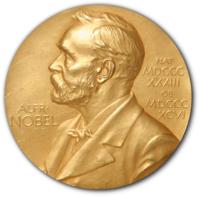
Photo from wikipedia
I am deeply honored to be the recipient of the 2018 Howland award, and to share with you some observations about the evolution of pediatric medicine as I have experienced… Click to show full abstract
I am deeply honored to be the recipient of the 2018 Howland award, and to share with you some observations about the evolution of pediatric medicine as I have experienced its growth over the last five decades. I will also share thoughts about what is needed to further advance health outcomes for children, youth, and their families. Before I proceed to do so, I would like to thank Dr James Perrin for nominating me for this award. He has been a lifelong champion for children with chronic disease and it has been my privilege to partner with him on several programs that address better outcomes for these individuals and their families. I would also like to thank my family for sharing this day with me, and for inspiring and informing my work over many years. In particular, I acknowledge the enormous influence that my wife, Dr Barbara Boat, a child psychologist, has had on my thinking and career orientation. Finally, I wish to thank the many colleagues, collaborators, and contributors to my learning, as a student at the University of Iowa, as a pediatric resident at the University of Minnesota, as a clinical associate at the NIH, as a pulmonary fellow and faculty member at Case Western Reserve University, at the University of North Carolina where I was privileged to lead the Department of Pediatrics, at Cincinnati Children’s Hospital Medical Center where I provided leadership for the Department of Pediatrics and the Research Foundation, in my work with various committees of the National Academies of Sciences, Engineering and Medicine, and in my work with many academic pediatricians in various pediatric organizations. I started pediatric residency in 1966. A 52-year focus on child health has afforded career experiences that I never predicted, often presenting as unplanned opportunities. I initially gravitated toward chronic disease and subspecialty care, targeting the health of individual patients for the first several decades of my career, then realized, perhaps belatedly, that much of what must be done to improve health for children requires the development and continuous improvement of strong research training and health care systems. More recently, population-based attention to behavioral and social determinants of health has captured my attention. A belated epiphany was the recognition that what is needed to improve population-wide child health is also needed to improve outcomes for families of children with chronic disease. I will return to that point. A brief recap of several personal career experiences will, I hope, provide insights into an ever expanding landscape of opportunities for improvement of child health. I will conclude by sharing what I see as the new frontier for pediatrics. I had no community practitioner role models early in life, and reflexively followed the pathway of my heroes, the physician scientists who were making discoveries in the laboratory. My research training started during a year of medical student research, a research intensive residency where “experiments of nature” were part of the daily conversation, and 2 years of research training at the National Institutes of Health, where I was an office mate with two future Nobel Laureates. I was not in their league, but I did forge a research plan focused on cystic fibrosis pathophysiology that provided an opportunity to independently build a research program in pulmonary medicine. This experience opened doors to fellowship and faculty posts as a physician scientist. I did not go to the NIH considering a CF or pulmonaryfocused career. In fact, pulmonology was a maverick pediatric subspecialty at that time, and was not on my consideration list. Two years of immersion in the world of cystic fibrosis care and research created a passion for improving outcomes for patients with chronic lung disease. A word to those who are in formative career stages: sometimes choices are part of a plan, but many opportunities are not programmed. Stay open to opportunity, choose thoughtfully, and passionately create a path that can be focused and productive. My research addressed the chemistry of human respiratory tract mucus and airway secretory biology using explanted human airway epithelium, a novel experimental approach at that time. The first book chapter I wrote was titled “Chemical composition of human tracheobronchial secretions”, in a book gloriously titled “Sputum”. While not attention grabbing in the medical community, I was thereafter viewed as a resource by adult and pediatric pulmonologist alike. My research had good and problematic dimensions: good because very few others were curious about airway mucus, and NIH funding was quite generous. It was less than ideal because the technology was not yet ready to rapidly advance this field, whether at a molecular or a translational level. Research challenges have flipped today. Technology makes addressing tough questions easier. Funding however, is more challenging to secure. Advancing a research career today demands thoughtful attention to both, as well as strong mentorship, a supportive environment and perseverance. Perhaps most importantly, today there is greater opportunity to address a broad range of research questions, not only in the laboratory but in the clinic. The science of translation has opened the door for investigators who are targeting new or improved diagnostics and therapeutics. The second phase of my career emerged when I moved to a chairmanship role at the University of North Carolina. I gradually
Journal Title: Pediatric Research
Year Published: 2019
Link to full text (if available)
Share on Social Media: Sign Up to like & get
recommendations!